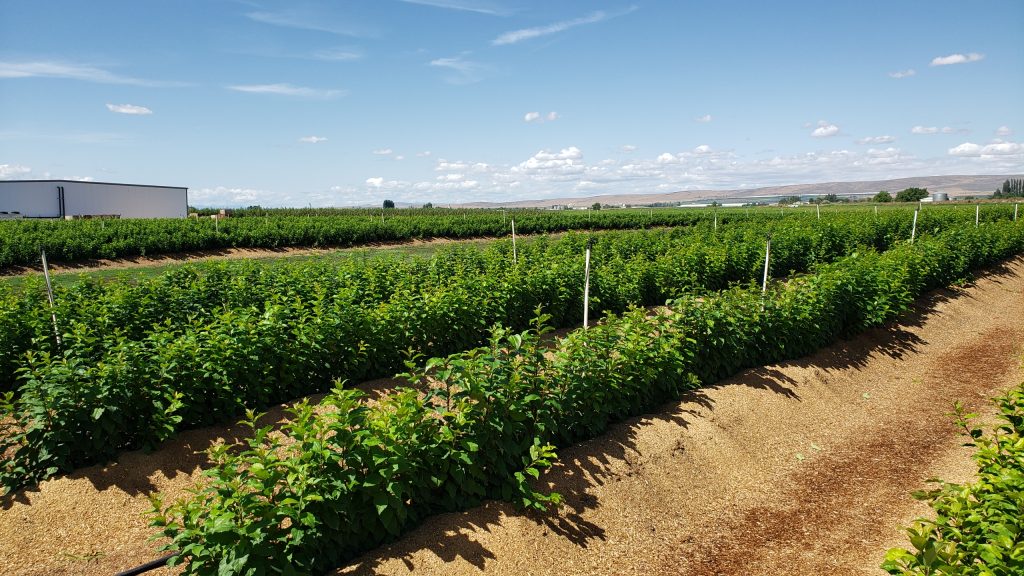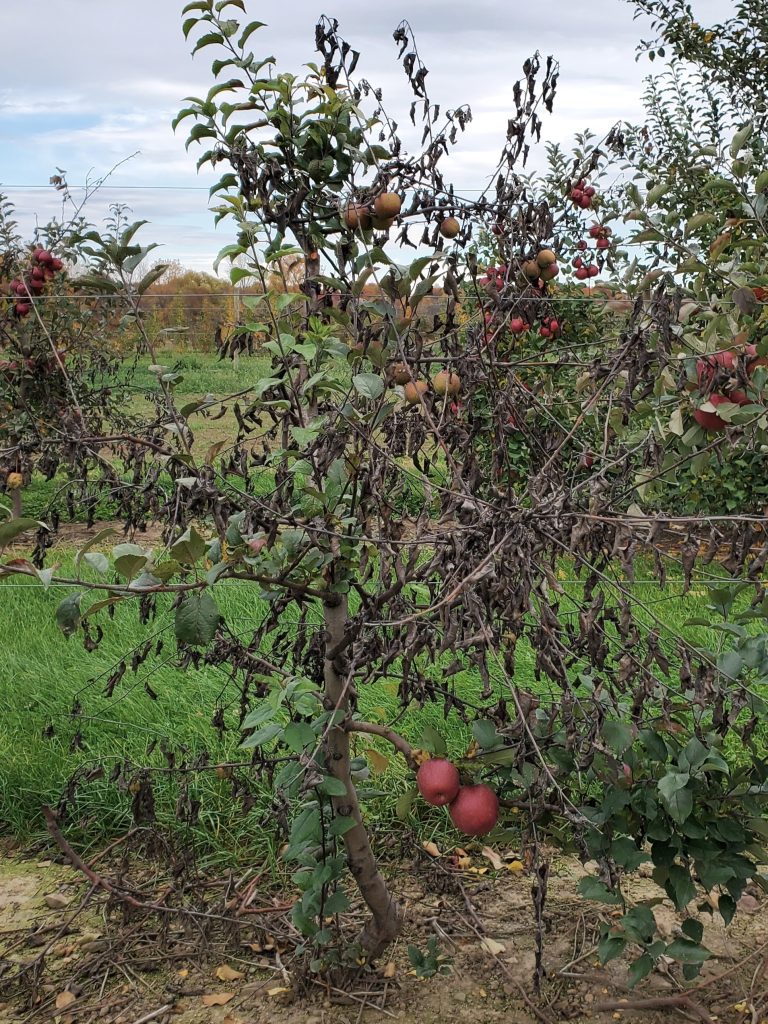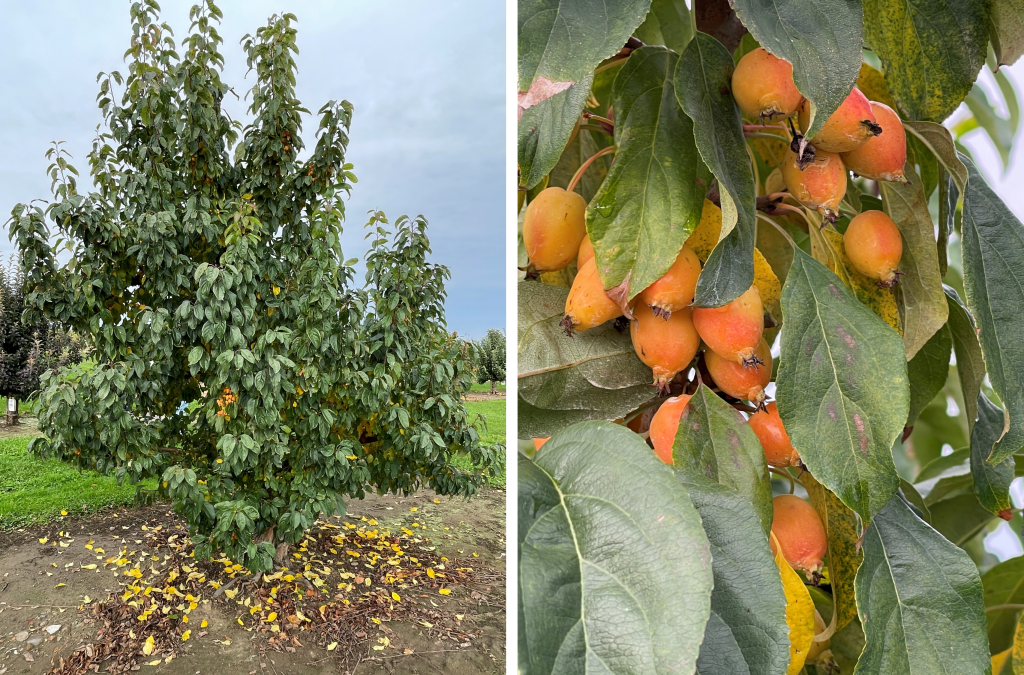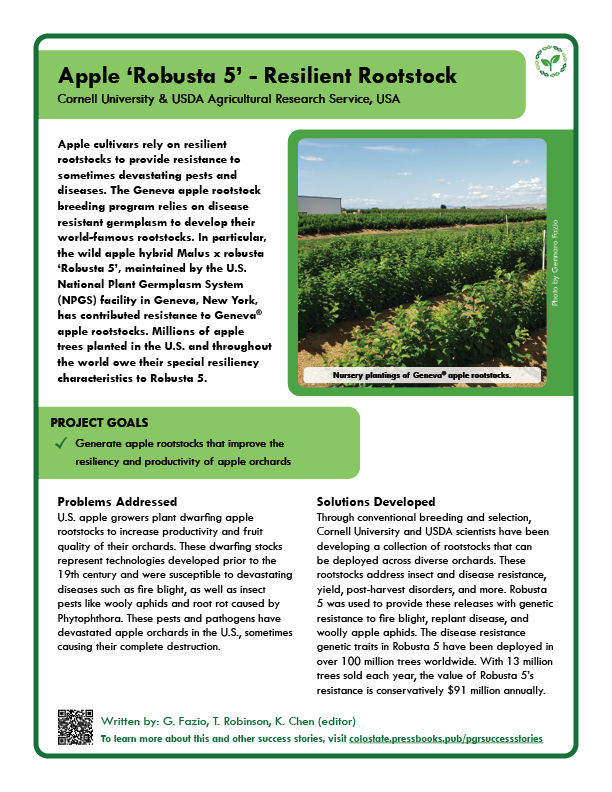Fruits and Nuts
Apple ‘Robusta 5’ – Resilient Rootstock
MILLIONS OF APPLE TREES BENEFIT FROM PRODUCTIVE, DISEASE RESISTANT ROOTS
Gennaro Fazio and Terence Robinson
USDA-ARS Plant Genetic Resources Unit, Cornell Agritech Campus, 630 W North St, Geneva, New York 14456.
School of Integrative Plant Science Horticulture Section, Cornell University, 635 West North St, Geneva, New York 14456.
Corresponding author: gennaro.fazio@usda.gov
OUTLINE
1. SUMMARY

Apple cultivars rely on resilient rootstocks to provide resistance to sometimes devastating insect pests and diseases. The Geneva apple rootstock breeding program—a coordinated effort between Cornell University and the USDA Agricultural Research Service (ARS)—relies on disease resistant germplasm to develop their world-famous rootstocks. In particular, the wild apple hybrid Malus x robusta ‘Robusta 5’, maintained by the U.S. National Plant Germplasm System (NPGS) facility in Geneva, New York, has contributed resistance to Geneva® apple rootstocks. Millions of apple trees planted in the U.S. and throughout the world owe their special resiliency characteristics to Robusta 5.
The project aims to generate apple rootstocks that improve the resiliency and productivity of apple orchards.
Download a printable fact sheet by clicking the image below.
2. PROBLEMS ADDRESSED

U.S. apple growers plant dwarfing apple rootstocks to increase productivity and fruit quality of their orchards. These dwarfing stocks represent technologies developed prior to the 19th century and were susceptible to devastating diseases such as fire blight, as well as a range of other problems including insect pests like wooly aphids and root rot caused by Phytophthora. These pests and pathogens have devastated apple orchards in the U.S., sometimes causing their complete destruction.
3. SOLUTIONS DEVELOPED

Valuable disease and insect resistance was identified in Robusta 5, a hybrid apple accession maintained in Geneva, New York by the NPGS. Through a systematic and lengthy process of conventional breeding and selection, Cornell University and USDA-ARS scientists developed a series of apple rootstocks incorporating this source of resistance. The breeding program has released more than 15 Geneva® series rootstock cultivars that now grow in apple orchards worldwide.
Some of these rootstocks have proven to be more productive and increase fruit quality parameters such as fruit size. They also have a distinct lack of post-harvest disorders such as bitter-pit in the famed Honeycrisp apple. What was a monoculture of old technology rootstocks in the year 2000 is now a diverse collection of rootstocks that can be deployed in very different climatic, soil, and orchard situations.
Collaborators involved in developing solution:
- James Cummins, Herb Aldwinckle, Randolph Gardner, and Terence Robinson, Cornell University Agricultural Experiment Station, Geneva, New York, USA
- Gennaro Fazio, USDA-ARS Plant Genetic Resources Unit, Geneva, New York, USA
4. IMPACT
It is estimated that the disease resistance genetic traits in Malus x robusta Robusta 5 have been deployed in over 100 million trees worldwide, providing protection from fire blight, replant disease, and woolly apple aphids. In the United States alone, more than 66 million Geneva® series rootstocks have been sold in the past 5 years. With an average of 13 million trees sold annually for $7-10 each, the total annual value of Robusta 5’s disease resistance is conservatively $91 million.
5. GERMPLASM
Malus x robusta ‘Robusta 5’ is a wild apple hybrid grown from seed originally sourced from Russia. The Central Experimental Farm (Agriculture and Agri-Food Canada) in Ottawa, Ontario, Canada selected Robusta 5 as a hardy rootstock. It was donated to the U.S. National Arboretum, entering into the National Plant Germplasm System in 1984.
More information can be found at GRIN-Global: PI 588825.
6. ADDITIONAL RESOURCES
The following resources provide additional information about Geneva® apple rootstocks.
Webinars
‘M9? G41? Apple Rootstocks Explained with John Strang‘ a 1 hour presentation
‘Gennaro Fazio: 50 years of breeding the Geneva® series of apple rootstocks‘ a 50 minute presentation
PDF Downloads
‘Unique Characteristics of Geneva® Apple Rootstocks‘ an overview by G. Fazio, H. Aldwinckle, and T. Robinson
‘Geneva® Apple Rootstocks Comparison Chart‘
News Articles
‘Three new apple rootstocks bolster Geneva’s program‘ in the Cornell Chronicle
‘The next Geneva generation: Breeding program releases three new rootstocks‘ in Good Fruit Grower
‘Saving apples: How a unique program at Cornell is helping the New York staple thrive‘ in Spectrum News 1
Peer Reviewed Articles
Rufato L, da Silva PS, Kretzschmar AA, Bogo A, de Macedo TA, Welter JF, Fazio G, Petry D. 2021. Geneva® Series Rootstocks for Apple Trees Under Extreme Replanting Conditions in Southern Brazil. Frontiers in Plant Science 12:712162. https://doi.org/10.3389/fpls.2021.712162
7. CHAPTER INFORMATION
Citation: Fazio G, Robinson T. 2024. Apple ‘Robusta 5’ – Resilient Rootstock. In: Volk GM, Chen K, Byrne P (Eds.) Plant Genetic Resources: Success Stories. Fort Collins, Colorado: Colorado State University. Date accessed. Available from https://colostate.pressbooks.pub/pgrsuccessstories/chapter/apple-robusta-5-resilient-rootstock/
Content originally submitted: January 16, 2024
Date of publication: June 10, 2024
USDA is an equal opportunity provider, employer, and lender. Mention of trade names or commercial products in this article is solely for the purpose of providing specific information and does not imply recommendation or endorsement by the U.S. Department of Agriculture.


